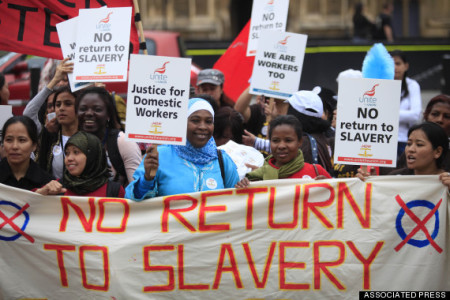Independent review links visa changes to domestic slavery
The Government is exposing thousands of women brought to the UK by wealthy Arab families to abuse. So concludes a Home Office-commissioned review of domestic worker visas, which has exposed shocking cases of slavery, violence, sexual abuse and people trafficking and led to accusations that tougher immigration controls could be responsible.
The Home Office requested the independent review, authored by barrister James Ewins, in March 2015 to investigate the state of the domestic worker visa system.
Domestic worker visa holders who accompany their employer to the UK legally must remain with that employer to fulfil the terms of the visa, which saw major changes in 2012. This has led to strong criticism – aimed squarely at the Home Office – that workers are put in a position where they’re unable to escape abusive employers.
Ewins says his review found “no evidence that a tie to a single employer does anything other than increase the risk of abuse and therefore increases actual abuse.”
The review echoes the findings of NGOs and rights groups that showed domestic workers are subjected to a host of abuses, including physical and sexual violence, deprivation of food and non-payment of wages. The review recommends workers should be allowed to change employers and stay in the UK for up to two and a half years.
About 17,000 overseas ‘tied’ domestic worker visas were issued by UK authorities in 2015, the majority of which were for Filipino or sub-Sahara African domestic staff arriving in the UK from the Gulf States – namely Bahrain, Iraq, Kuwait, Oman, Qatar, Saudi Arabia and the United Arab Emirates (UAE). Half of the total number of domestic worker visa applications received came from Saudi Arabian families and families from the UAE, states where reports of abuse of overseas domestic workers have been raising concerns and have led Uganda to issue a temporary ban on university graduates travelling to take up domestic worker positions (African Voice Issue 614).
A series of interviews, carried out as part of the Ewins review, found that domestic workers brought to Britain feared they would face deportation or arrest if they were to report incidents of abuse. One Filipino domestic worker interviewed described how her employer made her go days without food and prevented her from sleeping. She is now fighting to remain in the UK having been positively identified as a victim of trafficking. However, upon contacting the Filipino embassy to tell them that she was being abused by her employer, she was told that under the terms of the domestic worker visa she had to return to Saudi Arabia with him.”
None of the women interviewed were made aware of their rights under UK law. They had not seen a contract of employment prior to a UK visa application, which forms part of the requirements to obtain a domestic worker visa. Many said they had been pressured into signing visa forms without any knowledge of what they were actually signing.
Kate Roberts, the head of policy at domestic worker rights group Kalayaan, said: “Since this visa came into force in 2012, the government has received widespread condemnation of the conditions it is imposing on thousands of vulnerable women travelling with foreign employers into the UK, often with little choice, who are given no protection or agency when they are here.”
Other campaigners say that the release of the Ewins review makes it virtually impossible for the UK government to dismiss the idea that visa restrictions imposed on domestic workers make abuse more likely. However, the government insists that rules pertaining to domestic work visas are in place to prevent workers changing jobs as a pretence for remaining in the UK.
Meanwhile, the Ewins review recommends that the government starts compiling data on the number of women reporting abusive working conditions following entry to the UK.
In response to the independent review, a Home Office spokesperson said: “The government is committed to stopping modern slavery in all its forms. We are working to ensure we provide all victims of modern slavery and trafficking with the protection and support they need through the national referral mechanism (NRM), [a government process set up to identify victims of trafficking]. Anyone who reports being brought to the UK against their will for the purpose of work shall have their case considered under the NRM.”
However, campaigners say that while the government pledges to eradicate the abuse of domestic workers arriving in the UK on domestic worker visas, those abused are then pressured to leave the country. Campaigners say this results in a ‘wall of silence’ and they end up entering into illegal employment to send money home to their families.
President of the Filipino Domestic Workers Association, Phoebe Dimacali, said: “Women denied the chance to continue working in the UK legally run the risk of being trafficked back to the Gulf and the cycle begins again.”
Campaigners have been deeply critical of the visa scheme since its inception, decrying it as a “kafala” for the UK and have petitioned the government to abolish it. The kafala system in the Gulf States binds foreign workers to a single employer for the duration of their stay in a country.
Commenting on the report, Izza Leghtas of Human Rights Watch said: “[A] worker who is abused by her boss is faced with two choices: to stay and live with the abuse, or run away and risk deportation. This is a terrible ‘choice’, and leaves many trapped in horrific conditions.
“Migrant workers often live as virtual prisoners, with their passports confiscated. They work extraordinarily long hours for pitiful wages, and endure physical and demeaning psychological abuse, with no holiday or freedom of movement.”











